Peter Pan is one of the greatest children’s stories in western literature, as its constant revival proves. But what makes the Pan so inspiring, so worthy of our adoration? Why do we cling to this tale with every childlike corner of our hearts, and dread its bittersweet end? Why does the tale of Peter and Wendy attract child and adult alike, long past the point of growing up?
This may come as a surprise to you, but it’s probably because the Boy Who Won’t Grow Up is—in actuality—a terrifying protagonist.
The excellence of Peter Pan is owed to its complexity. It’s one thing to have a protagonist who wants to remain a child forever, but author J.M. Barrie was never content to create such a hero without ruminating on this desire under a microscope. While Peter laughs and crows his way through adversity, Wendy Darling is present to see through the facade of his being. When he insists that all he wants is to be a boy and have fun, she knows it is his greatest pretend of all. And it’s lovely that Wendy is a sensitive enough human being to realize that perhaps Peter isn’t as confident in himself as he claims. But the compassion she displays toward him makes her entirely blind to the more unsavory aspects of his person.
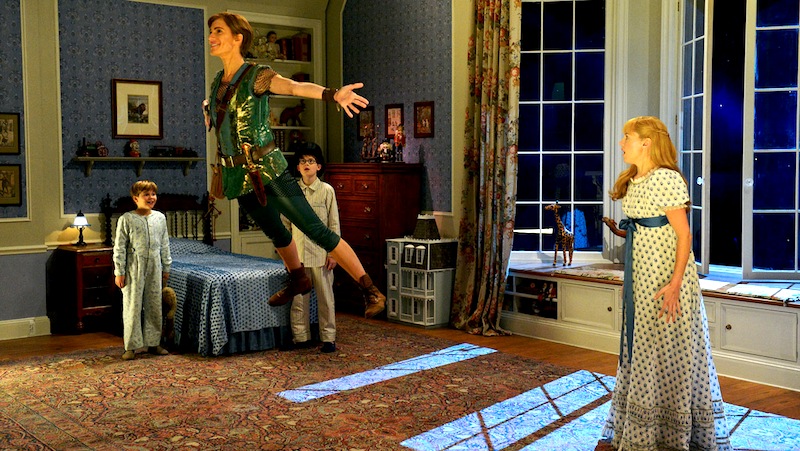
Here’s the thing about Neverland—it is Peter’s playhouse. He is like the guy who owns the casino; the house always wins and he is the house. Everything in Neverland is set up so that it caters directly to his whims. We are unclear how much of the island truly exists at all without his input. Fairies are real, independent of Pan’s influence, but literally everything else is probably down to him. He wants mermaids in the lagoon, so there they are. He wants a hideout carved into a tree, though he has no construction abilities to call on, and it appears.
And when Peter is away, Neverland stagnates. There is a cycle to the island that keeps everyone occupied until his return; the Lost Boys and the pirates and the indians and the animals all form a continuous loop, tracking and following one another. When Pan returns, the loop breaks, and people go about their business. This is tackled similarly in film narratives—the 2003 movie showed Neverland under ice, in eternal winter; Smee realizes that Peter has come home because spring returns to the island. Similarly in Hook, we see flowers wake and bloom in reaction to Peter’s arrival.
Peter Pan is lord dictator of Neverland. His word is law. His adventures take precedence. His desires are paramount. Super fun as an avatar for any child, but what about everyone else who occupies space, who breathes Neverland’s air? What happens to the indians, the Lost Boys, the pirates? They are only relevant in terms of how they play into Peter’s story. If you need any further proof of that, I will direct you to one word, kids:
Murder.
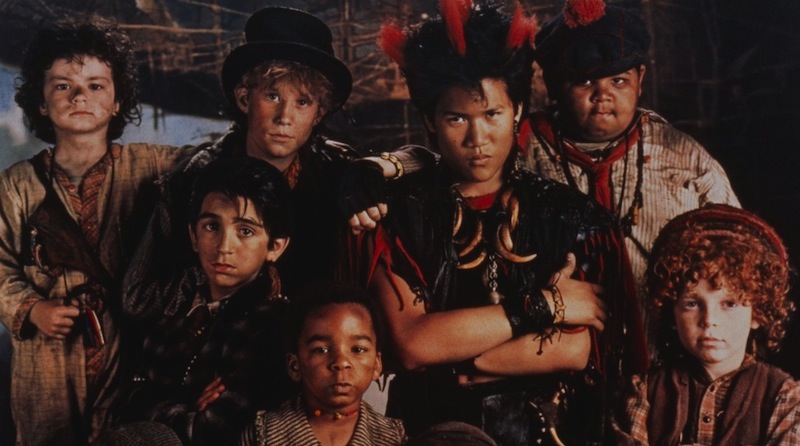
Barrie states—in no uncertain rhetoric—that when the Lost Boys get too numerous, Peter Pan thins out the herd. Doesn’t matter if he liked them, or if they were good for a laugh, or if they’ve been around a long while. At any point, Peter might decide they’ve been made redundant. And we have to assume that he either deliberately leads them into danger, or that he does the deed himself. He probably uses both tricks. Peter Pan cares so little for his compatriots, that he takes no issue at all with killing them. Basically everyone else is only relevant in how they think of Peter; he rescues Tiger Lily from the pirates, a princess of her people who refuses to marry because she’s carrying a torch for him. Nothing else about her person matters within the context of his adventuring. She exists to be a damsel that he can rescue because Peter is the hero and that’s what heroes do.
On that examination, his behavior toward Wendy Darling makes even more sense. His attachment to her family is passing fancy, nothing more. They are briefly interesting. They are equally disposable. He’ll return in a generation or so to whisk away her daughter, and the daughter after that, his own never-ending supply of occasional moms-when-he-wants-them. The only being on the island who is really a match for Peter is Tinker Bell, and that’s because the two of them are so much alike. No wonder she selected him as her human baby BFF. And tellingly, she is the only person Peter shows deep, genuine emotion toward. You have to wonder if Tink knew/cared about the amount of power she was handing over by bringing him to Neverland in the first place.
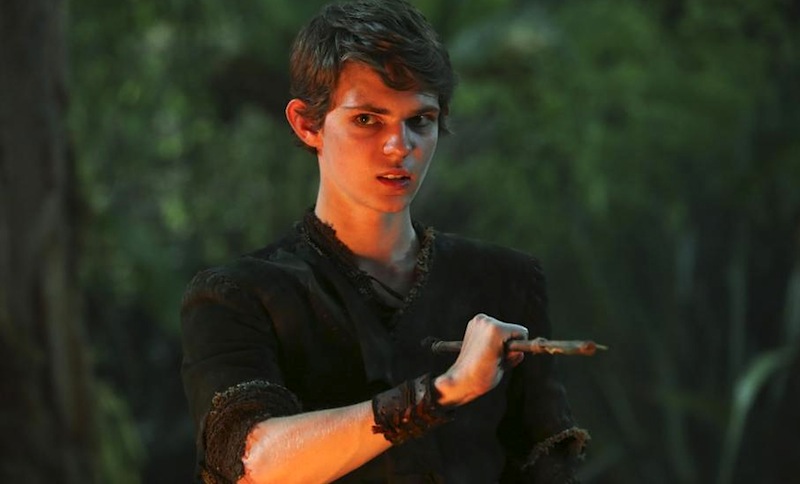
There are other versions of Pan that play into these dark aspects of the character. Once Upon A Time shows Peter as a grown man who wishes for never-ending youth to escape the burden of parenthood. Brom created a sinister retelling of Pan in his novel The Child Thief, playing with Peter’s penchant for targeting children who are lost, forgotten, or abused. In both of these versions, the boy’s sunny and heroic nature is dispensed with, addressing his knack for manipulation and his cold detachment from the children he lures to his realm.
Which brings us to Captain Hook, the person who is meant to be the tale’s antagonist, the true villain in Pan’s mind. The man who only has a rivalry with Peter to begin with because the kid cut off his hand and fed it to a crocodile. That is the entire basis of their relationship. And knowing what we know about Peter, we can readily assume that this wasn’t an act of revenge or a good deed to help out the rest of the world. Pan probably found the Jolly Roger and decided to pick a fight for fun. Hook is a gentleman’s pirate; he went to Eton College (I kid you not), he’s obsessed with good form. He would have been an utter delight to Pan’s sensibilities, the perfect grown man to torture.
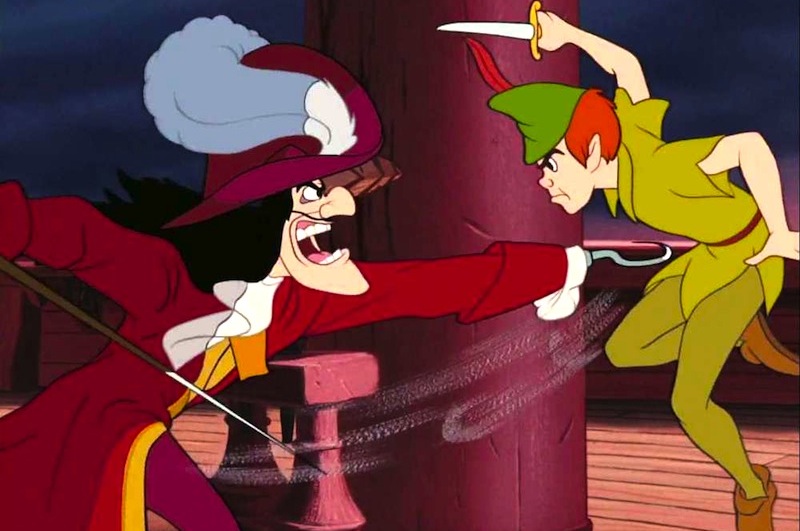
Is it any wonder that Hook is the baddie of this story? His entire life breaks down at this exact point. He devotes the rest of his life to beating Peter for the slight, and for all we know, he has no choice in that matter. He exists to be available to that “clever” and “wonderful” boy, who taunts and humiliates him, then flies away with his band of delinquents, laughing the whole way to their hideout. Hook’s autonomy is forfeit. He is now and forever defined by Pan. If you don’t feel sorry for the guy, you’re not looking at the big picture. No one should be expected to endure Hook’s existence.
What’s worse, he never comes remotely close to beating the kid. Sure, he gouges him with his hook and leaves him to die, but that’s a clear Act 2 Fight if there ever was one. Most of the time, Peter just hangs around the Jolly Roger to stoke his own ego. When the final battle between them occurs, Peter massacres Hook’s crew, and only Smee and the first mate Starkey get away. Pan kicks Hook off his own ship and into the mouth of the ticking crocodile (bad form again), and it’s all around excellent for our hero—he has literally and figuratively beaten adulthood. Mrs. Darling never has a chance of keeping him, but you have to be relieved on behalf of this particular set of Lost Boys—at least they’ll survive.
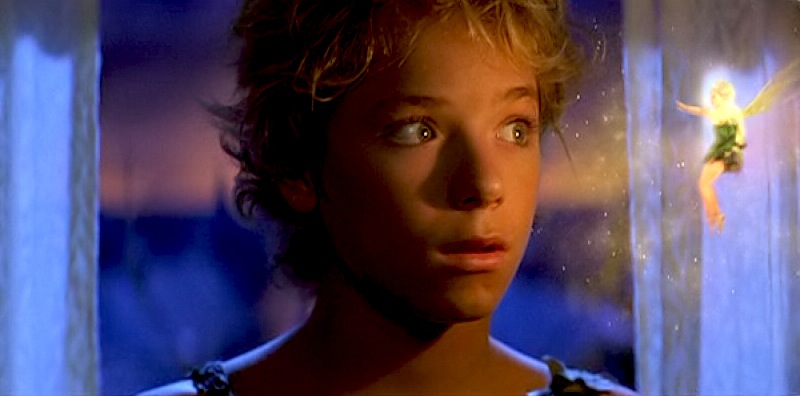
But there will always be more of them, won’t there? And that’s the real trick of Pan’s existence. He has a never-ending supply of everything he needs. No wonder he won’t grow up. But what Peter doesn’t realize is that he’s far from the hero of his story—in fact, he’s closer to Hook’s side of the fence than he’d ever admit. And maybe that’s the truth of it. Maybe Peter Pan wants to fight Hook to prevent himself from becoming Hook.
Either way, the boy who runs never Neverland is not the hero he proclaims himself to be. And perhaps that’s why his story is so enjoyable in the first place. Our love for Peter Pan is not determined by how righteous he is, but by how he challenges our preconceptions about the blamelessness of childhood. Because as Barrie states, Pan will always come back to steal our runaways and lost boys, and will continue to do so as long as children are “Innocent and heartless.” The genius of Pan’s tale, is that innocence does not automatically denote goodness. Instead, it makes a child’s lack of experience a very frightening thing after all.
Emmet Asher-Perrin spends a lot of time deconstructing Neverland, and knows it’s probably an unadvisable way to pass the time. You can bug her on Twitter and Tumblr. Read more of her work here and elsewhere.










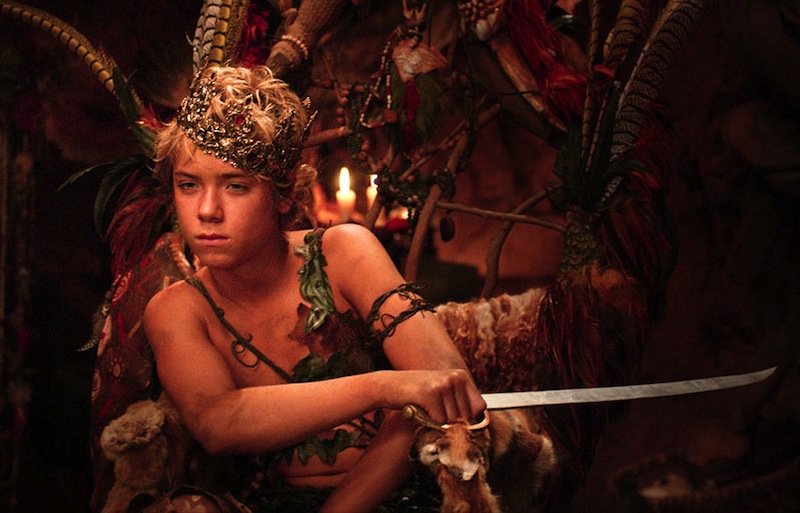
Wow.
Are you familiar with the RPG “Changeling: The Lost”?
If not, I strongly suggest that you have a look at it, because it fits your article perfectly.
Ciao!
This makes me think of Dennis the Menace on a similar level: Though intent on having fun, he is nonetheless hazardous to be around; and if his parents don’t figure out how to bring him under control, he’ll probably grow up and get somebody killed.
But isn’t he so much fun to watch!
This also makes it seem like Neverland is a domain in the demiplane of Ravenloft, and Peter Pan is its darklord.
Realizing that Pan isn’t necessarily the awesome good guy you thought he was is another of those “Oh damn I’m an adult now.” moments.
Like when you realize that Rodney Dangerfield’s character in Caddyshack is really more of a jerk than Ted Knight’s.
I look forward to seeing where the 2015 movie “Pan” will fall into this schema. From the trailers, it’s Peter Pan before all of this, so I wonder what elements it will show that lead to this interpretation.
pretence
being “young” like Superman or Batman young forever sounds like fun.
Stuck as a child sounds like a nightmare.
I have noticed a number of books in the last few years with Hook as the hero. I don’t know if that is a “bad boys are sexy” thing, a “pirates are in” thing or a realization that Pan is a creepy little kidnapper and deserves to be the villian thing.
Fascinating article.
Peter’s last name isn’t “Pan” for nothing. He’s obviously a version of Puck or Pan or some other powerful nature spirit/fairy.
Isn’t it also possible that when Peter “thins out the herd”, he’s not killing the other Lost Boys (or letting them be killed) but just kicking them out of Neverland and letting them grow up? That’s a fate that he and the other Lost Boys might equate with death, but in reality would be the best thing to happen to them.
This article made me wonder how to survive Neverland. I managed to design a plan to defeat Pan (and it’s not easy to kill an omnipotent being), but I couldn’t ucceed in finding a safe way to make him a wiser person: how can you teach a kid who can make you endure the worst tortures he can imagine if you ever happen to bore him? You’d have to be a supernaturally good parent model to succeed…
Which led me to this plot bunny: Mary Poppins arrives in Neverland.
Wow.
I thought that Peter Pan was a “fairy” in the traditional sense even before reading this: playful, spiteful, temperamental and magical. But I had no idea the whole setup was this sadistic. He really is like a malevolent little god of his own world.
Ursula Vernon has a great short story on this topic:
http://tkingfisher.com/?page_id=208
The description of Neverland as being controlled by Peter really sounds like the Twilight Zone episode (based on a short story by Jerome Bixby) “It’s A Good Life,” where a three-year-old boy has godlike powers over his town, terrifying all the adults.
Not only was OUaT’s Pan a villian, his son, Rumplestiltskin, grew up to become the Dark One and is currently tormenting OUaT’s (hottie) Cap’n Hook.
I never read any of the Pan literature (actually, I never even saw the Disney cartoon until recently; aside from a performance of Peter Pan on Ice, I think most of my Pan knowledge came from Hook). Peter Pan does seem to have that kind of Lord of the Flies undisciplined arrogance streak to him, though. I’m not sure if his actions need be outright malicious, but as you say, it’s more like he’s a child who gets bored with things and has god-like powers, like Trelane.
Anyway, reading your article made me wonder if Neverland really was just ALL pretend, and Peter was just some orphan boy on the streets of London who climbed into windows at night. Maybe he beguiled the Darlings by saying he “flew” up there and told them his stories of Neverland that he made up.
I think Hook, though, does a nice job of blending the important parts of both childhood and adulthood, while showing that both can have dangerous aspects. The point of the film was not to say “never grow up” and that Pan should go back to Neverland because that’s where he belongs. In the end, he belongs with his family, in his adult world. Growing up is not bad; that’s what has to happen. And it can be a good thing–certainly that adult lens can be good and you need that to temper an attitude of not caring about anything and “I just want to have fun all the time.” That can be dangerous, because that’s not what life is. And as you point out, Pan’s idea of fun can be bad for other people. But in the movie, Peter did learn that sometimes the “Suuuper Important” things of adulthood aren’t all that super important, and that there are some aspects of childhood that are worth holding onto.
Anyway, as interesting is deconstructions are, I think it’s a little too far to say this all is maybe the reason why people like Peter Pan. I’d say for the vast majority (I almost wrote, “mast vajority”) of the public, the surface elments of a kid fighting pirates and fairies making you fly is what is appealing about it. Not to mention there’s probably some “Classic” syndrome going on–it’s such a prevalent part of our culture that we are essentially told we have to like it from a young age. Though I’m sure there are some who like to delve into the stories on a more intellectual level like this.
@12: I would definitely like to see Mary Poppins come to Neverland and have a superpower show down with Peter Pan. Side question: Did Mary Poppins go to Hogwarts?
@17: I suspect Mary Poppins predates Hogwarts. I don’t mean that PL Travers was writing before JK Rowling, I mean Miss Poppins probably taught at least one Founder.
Hah! I scrolled down to link the T. Kingfisher story (is it reasonable to un-pseudonymize on Tor, which is after all not a children’s site?) — and lo and behold, someone else has had the same thought.
In the book, Mrs. Darling remembers that “There were odd stories about [Peter Pan], as that when children died he went part of the way with them, so that they should not be frightened.” There’s some evidence that the Lost Boys are dead and that Neverland is a way station before they are ready to move on.
Although that line about thinning them out totally freaked me when I was a kid and read it. Peter’s eternal youth and innocence is always double-edged. The tragedy and terribleness of Peter is summed up when Barrie says, “It has something to do with the riddle of his being. If he could get the hang of the thing his cry might become: ‘To live would be an awfully big adventure!’ But he can never quite get the hang of it”.
I just read Alias Hook by Lisa Jensen — a terrific book btw — which is on exactly this topic: Peter being the cruel dictator and Hook cursed to stay there and fight him. I think Barrie was right in portraying Peter as both an innocent child and something truly scary — hence the name Pan, which we should never forget is the source of the word “panic.”
I’m the author of “Hook & Jill,” a serious parody of the Peter Pan story, an award-winning literary novel of Neverland intended for grown-ups. I’ve done a great deal of research into J.M. Barrie, his inspiration for his works, and the evolution of Peter Pan. I took care that “Hook & Jill” stays very true to J.M. Barrie’s vision of the Neverland. I find much to debate in this article, but will simply mention here that Peter was born of the love Barrie held for his five adopted boys. I urge your audience to read Barrie’s 1911 novelization, “Peter and Wendy,” and to peruse Andrew Birkin’s detailed work, “J.M. Barrie and the Lost Boys.” While Peter has his dark side (with which I deal in “Hook & Jill”), it would be a shame for your audience to believe him a monster. Also please bear in mind that Barrie’s original story has been changed from spin-off to spin-off, and that Barrie’s Neverland is altered according to each interpreter’s whims. The 2003 Paul Hogan film is wonderful, although it makes some changes, too. You’ve attributed some of that film’s sequences to Barrie, which is inaccurate. I encourage everyone to read the original works by Barrie — “The Little White Bird,” “Peter Pan, or, The Boy Who Wouldn’t Grow Up,” and “Peter and Wendy.” This month is the 110th anniversary of Peter’s entrance into the world — what better time to get to know him in his original form once more?
There’s a big difference between the original stage-play Pan and the later, book Pan. I’m not sure what happened in the intervening years, but the Peter Pan described in the book is exactly as this post suggests, and children in general are described in less than flattering terms. In a way Barrie deconstructed his own creation before anyone else could do it.
One thing though, the book nmakes it clear that Neverland is the result of the combined imagination of kids everywhere, so the reason it’s inhabited by pirates and indians is becuase these are the tings that cought kid’s imagination a tthe time it was written.
Never did like the Disney version ( I was much more interested in mermaids at the time, and thought TinkerBell a snob) but later thouroughly enjoyed Hook.
Much later I had a chance to read (or at least skim) Barrie’s book, and really, one part, to me, explained why he is how he is. I’m paraphrasing badly, but it was explaining that he constantly forgot. There was a line about how every time he fought with Hook and realized that Hook was actually trying to harm him, it was a fresh shock, because he had forgotten. And this was explained as necessary for him to constantly remain a child, because if he remembered, he would gain experience and knowledge, and grow up.
Around the same time I read Eloise McGraw’s The Moorchild, about a half-human changling, who bounces back and forth between her parents sides. At a certain point the protagonist looks at her mother’s people from a human veiwpoint, and realizes that they just don’t care. The humans might think “the folk” of the story are malicious, but they just think it’s something “fun.”
And it’s the same thing with Peter Pan. You have a child with basically demetia at six years old, raised by tiny fairies, who have no more morals or sympathies than he. Any wonder they can all look like psychopaths?
While we’re throwing out revisionist Pan novels, Christopher Golden’s fantasy thriller Straight On ‘Til Morning has a group of kids fighting their way to Neverland to win back a friend that the sadistic Pan spirited away.
@12 – I would love to see Mary Poppins whip the Lost Boys into shape. It would be a pretty amazing battle between Peter’s chaos magic and Mary Poppin’s order. And if we take it one step further (well, a few steps), Alan Moore believes that Mary Poppins = God, so does Peter = the Devil?
I have never read the book either, but even the Disney movie, Pan had a bit of a capricious edge (and actually, I think Tinker Bell is even worse).
But I love Hook and I was going to say something along the lines of crzydroid that it gets a nice balance of childhood vs. adulthood, and Pan grows/moves on.
But that short story was pretty awesome too.
I also had the thought that ‘thin the herd’ may just mean kicking the kids out of Neverland.
I remember reading that there was a significant backlash against “Peter Pan” after the outbreak of World War I, focusing on his line about how “to die would be an awfully big adventure” being perhaps an unconscious motivation for all the young Englishmen who eagerly enlisted in 1914 for an “awfully big adventure” only to die horrifically at Mons and Ypres and the Somme.
SERIOUSLY? This is mind-blowing to people? Peter the eternal child being a dark and sinister figure is not news. I swear to god everyone who realizes how ~dark~ Peter is treats it like some sort of revelation.
So many of the modern retellings of the story deal with this aspect of Pan. OUaT. The Child Thief. Another Pan. Alias Hook. Hook and Jill. Midnight in Neverland. For crying out louad, even Peter Pan in Scarlet, the official sequel, dabbles in these themes.
It’s a cool story to explore, but being shocked by how dark Peter Pan is, is like being shocked at how dark the Grimm fairy tales are.
It’s not a Pan movie, but Spike Jonze’s Where the Wild Things Are also explores this dark nature of children. That children, in their innocence, can be uncaring and heartless (also Catherynne Valente’s The Girl Who Circumnavigated/Fell Beneath/ Etc Fairyland). I think it’s a facintating subject to discuss. It’s not that these kids (even Pan!) are evil or bad or unkind, but rather that they’re carefree and innocent to the point where empathy just isn’t there. And until they grow up (which Pan never will) they won’t experience the true pains of life and understand that other go through these pains too.
In Wild Things, this is explored with the lashing out of strong emotions. A child not know how to handle overwhelming anger or sadness and creating more anger or sadness in the process. Valente’s Fairyland series deals more with the heartlessness of children (its a recurring theme actually). I highly recommend it both for it’s peautiful prose and wonderful story.
I’ve always hated Peter Pan with a passion. He seemed like a spoiled violent brat to me. I never got the attraction. Plus, what kid doesn’t want to grow up? It makes no sense. Every kid looks forward to the day when they get big so they can do all those things denied them because they’re children. So yeah, he was never a hero to me, just an illogical monster.
(Maybe it helps that I had brothers and always played with them and their friends who were a whole lot more clever and fun than Peter and his gang?)
Wow I never thought about it that way and I loved hearing your thoughts on it. So well put and so very spot on. Innocence definitely does not equate to goodness.
Wouldn’t it have been wonderful if the creator (d. 1910) of Huck Finn and Tom Sawyer had commented on Peter Pan (play 1904; published as Peter and Wendy 1911)?
@32: If he had, he might have said, “It breaks all the rules of real life drama, but preserves intact all the rules of fairyland, and the result is altogether contenting to the spirit. The longing of my heart is a fairy portrait of myself: I want to be pretty; I want to eliminate facts and fill up the gaps with charms.”
Why are you trying to make Peter Pan out to be a villain? The only knowledge you have of Peter is what you’ve read in the book. It seems that you’ve skipped over the fact that Peter’s parents pretty much abandoned him, the poor kid tries to come home and it seems that his parents have replaced him with another son. For all we know, the parents probably didn’t even try to search for Peter. I’m sure if you came home only to find out that your parents forgotten you and replaced you with another child, it would mess you up as well. Your also forgetting that Tinker Bell more than less kidnapped Peter, she’s the one that raised him and taught him everything he knows. If you want to blame anyone for Peter’s bad behavior, you should be blaming Tinker Bell. I’m sure your well aware that Tinker Bell is somewhat evil based on what we know, and that Tinker Bell would kill people if she could. Tinker Bell was pretty dead set on killing Wendy. If it wasn’t for Wendy’s necklace, Tinker Bell would have succeeded. As for the rest of your bad analysis of Peter Pan… It sounds like your trying to make Hook out as the victim, when he clearly isn’t. Hook is a theif who kidnaps children, robs, and murders people. Just because Hook had some supreme college degree, he was still a lowlife that had nothing better to do than chase innocent children. I have no clue what the point of writing this article was, but it seems pretty irrelevant to much of anything. The whole thing just seems like a waste of time, sorry.
Peter Pan, to paraphrase somebody, is not only stranger than you imagine: it’s stranger than you can imagine. In the 1911 novel, Barrie makes it clear that Neverland is a construct of the child mind: “Of course the Neverlands vary a good deal…but on the whole the Neverlands have a family resemblance, and if they stood in a row you could say of them that they have each other’s nose, and so forth.”
He goes on, “Of all the delectable islands the Neverland is the snuggest and the most compact; not large and sprawly, you know, with tedious distances between one adventure and another, but nicely crammed. When you play at it by day with the chairs and the table-cloth, it is not the least alarming but in the two minutes before you go to sleep it becomes very nearly real. That’s why there are night-lights.” And that’s when Peter appears–after dark.
So the version of Neverland in Barrie’s book is the joint creation of the Darling children–and the joint creation of Barrie and the Du Maurier clan.
Most everybody knows about the odd relationship between the reclusive Barrie and the boisterous family of Sylvia Llewelyn Davies., but I don’t think many people know about the collaborative effort between Barrie and Sylvia’s Du Maurier clan. Back in another millennium I did a paper on the Du Maurier influence on Peter Pan. Sylvia and her brother Gerald Du Maurier were the children of George Du Maurier, who was a wildly popular cartoonist and social critic. And if you look at George’s drawing room cartoons, I think you’ll recognize the Darling household. High-strung father George Darling is very much a character from a Du Maurier cartoon.
The characters that we know from the 1904 play–the Lost Boys, the pirates, etc.–were largely created by the actors who originally played them, and their interpretations were handed down from production to production. Sylvia’s brother Gerald was an actor. He played BOTH George Darling and Captain Hook. (Wrap your head around that.) Because of child labor laws, Peter was played by an adult woman–in the original production by Maude Adams and later by Gerald’s daughter Angela Du Maurier. Angela was born March 1, 1904, and, yes, she’s the Angela in Wendy Moira Angela Darling. She also played namesake Wendy in a couple of Peter Pan productions.
If you think about it, there’s something just a little bit weird about both Wendy and Peter being played by actresses–but there was a perfectly logical reason (those child labor laws) about Peter being a drag king. However, when I did research for the paper on the Du Mauriers, I came away the feeling that Barrie had actually put some of Mama Sylvia into Peter! Alas, I no longer have a copy of my manuscript–though it was published in Mythlore about 1989-1990. I always think I will track it down someday.
@Jessie Ellen: I don’t think Peter’s parents abandoned him. Peter forgets things. He says he went home, found the windows locked, and another son in his bed. There’s no telling how long he was gone. There’s really no telling if it was his younger brother, a nephew, or a complete stranger in the bed. Just as he returned for Wendy, found her grown up, and took her daughter with him instead…
“The Terrible Tragedy of Peter Pan” Is a play from about a decade ago that’s having a little bit of a revival lately. Not quite “Pan is the villain” from what I understand, but definitely follows the “Pan is a twisted individual” train of thought of this post.
@33 — But did Twain write that? I am not a Twain scholar, but I have scholarly research tools and have not seen a source in Twain’s own writing that includes that passage. That wish to be pretty doesn’t sound Twainian. All the sourcing for that quote is secondary. Meaning all the sourcing I have seen is secondary, which doesn’t mean that these words aren’t there among the vast number of words that are the writer’s.
But it’s like the quote from Woodrow Wilson about D.W. Griffith’s vile The Birth of a Nation — when one went hunting, which, evidently, no one else had thought to do previously, it was learned that Woodrow Wilson did NOT comment:
Of course, there are a plethora of racist remarks that WW made, that are verified. But this one, the most famous, wasn’t said, at least, not by WW.
Well, thanks for the clarification. I got that quote from using Google. I only included it because I thought your original comment was a little vague or teasing, so I just wanted to see if he HAD said something (your comment seemed to be hinting) and then decided to post it for the people who might not read so much into your comment.
I did find another supposed quote by Clemens on the subject, to Maude Adams: “It is my belief that Peter Pan is a great and refining and uplifting benefaction to this sordid and money mad age; and that the next best play on the boards is a long way behind it as long as you play Peter.” This was apparently published in the Boston Globe on October 9th, 1906, page 13. It was supposedly an ad that Clemens himself took out, but I’m not sure how to verify that.
The quote I reposted above is apparently from an interview with journalist Marlen Pew. So I don’t know if you can find a primary source for that.
@35 “He played BOTH George Darling and Captain Hook. (Wrap your head around that.)” I always thought that was a perfect bit of casting – George Darling is archetypical male grownup in the real world, and thus the nature enemy of Pan – so of course, Hook looks just like George in Neverland.
Bester’s “Oddy and Id” and Tenn’s “Malted Milkshake Monster” are better fits than “It’s A Good Life” – Anthony has to exert his will to make things happen, whereas the world shapes itself automatically to the desires of Oddy and the Malted Milkshake Monster.
@38 — Apologies for being so far behind, which I still am. Thank you for taking the time looking for verification of the Twain quote.
When I have a little more time, I’ll try and find the information you so generously provided in the historic newspaper databases — just because it would be so satisfying to KNOW that Twain did indeed know Peter Pan and had thoughts about him. :)
Jessi Ellen you clearly have not read the original books. Peter Pan runs away from home to live from faeries. A long time passes before he tries to come back to his mother. In those many years (remember that time passed much slower for him) his mother had another child and barred the window out of fear she will loose another child. he could have went to the door , he could have shouted to her, but he did not. He chose to remain with the faeries and to blame his mother for his actions. (Peter Pan in Kensington Gardens). About the pirates we do not know much about them. We do not even know if they are pirates. Also the story states very clearly that Peter and his gang attacked and killed Hook’s crew for fun (yes it is the book). Also at any point in the story we never see Hook wanting to hurt anyone else except Peter. And that only because he cut his arm and fed it to a crocodile. He is nothing less than a demon. About TinkerBell you must realize that faeries before Disney sanitized the stories were much more like the Mafia: you had to be careful not to upset them, not to trespass their territory, pay protection fees, and maybe they will leave you alone. Actually most stories about faeries involve faeries stealing someone child and the replacing it with either a fairy child or a log that they enchanted to look like the missing child. After the replacement the familly would have a series of bad happenings: heir crop will wither, their animals will go thin and die and they themselves will get sick. Actually the only times when faeries do anything good to anyone is when they pay a debt. For instance freeing a fairy something may get you some reward. There is almost no old story about faeries that speaks of them doing good to a human been for another reason. Faeries are vicious evil creatures.
“Pan? Oh, he started off wishing people into the cornfield, but under a benign influence moved on to fighting pirates, then much later Daleks; he is now living a comfortable retirement, as it were, in Lower Tadfield.”
I personally like Peter Pan more as a villain in OUAT. I like it when one character has all the power and all of the control and he is evil on top of it all! Thanks OUAT for creating a better Pan.